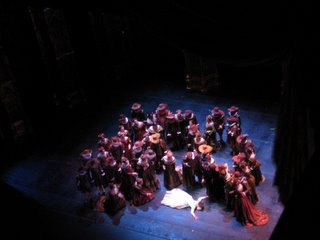The day after the Day After

... and I'm still dazed. But what's this silence about? I'm surprised to find so little blognoise and listchat about Lorraine Hunt Lieberson's phenomenal New York City appearance: there's Alex (who's reserving further comment for a New Yorker article in the spring) but no Steve (damn that tummy bug: bad leftover turkey?). Meanwhile, the New York Times spent space on the Boston premiere a few days before, therefore nothing more about the Carnegie Hall visitation. We try to avoid the New York Sun, but would never miss the queen(l)y emanations of its version of "music critic" Jay Nordlinger, who never fails to elicit a laughing WTF from Sieglinde. (On slow blogweeks, Sieglinde promises a dissection of her favorite Nordlinger "reviews." You will die.) Well folks, he was there; he calls Neruda "the bad old communist," characterizes Lieberson's Songs "Romantic in nature, and slightly Latin American," and continues the standup routine by noticing that "the presence of the Spanish language can make virtually any notes sound Hispanic." (OK, you get the picture; I suggest to print out the "review" and save for a sad, rainy day.) Anyway, he liked LHL nonetheless (but does that count?). Meanwhile, another netreview (via ConcertoNet.com: new to me too) was less generous about the husband's work (and the rest of the evening's program of Strauss and Mahler) ... But no substantial Opera-L hysteria? Strange.
Speaking of the Mahler, I'm a (shy) Mahler newbie, and would not dare comment deeply on the non-vocal aspect of Levine's rendition. (I'm quite familiar with much of Mahler's vocal work, however; surprise, surprise.) The hourlong Symphony No. 4 ends with a peppy little soprano solo; we got Heidi Grant Murphy (subbing for Dorothea Röschmann, elsewhere occupied), who tried her best. On this rare occasion I was frighteningly close to the stage (second tier, side) (so I could savor the LHL): during Grant Murphy's solo, I feared for my sisters sitting up in the upper balconies, who may have heard nothing more than two or three top notes. From my dear vantage point, I saw that she mimed her lines through the lower registers with a lot of gusto. Didn't hear much, but I forgive her and the many other aging light/lyric sopranos suffering similarly.
I actually enjoyed the Mahler. [Sidebar: months ago, I asked ionarts's jfl for (among others) non-vocal classical instruction, and he promptly provided me with a starter list of recordings to get me on track. I'm embarrassed to say that I have yet to find the station. So I'm shaming myself in public; let's see if that works. But opera is so f*cking all-consuming (emotionally, temporally, economically) that it's nearly impossible to obsess about anything else. But knowing now that the way to jfl's heart is through Mahler, Sieglinde will drop the Nixon in China temporarily for some sizzling 6th.]
But Lorraine Hunt Lieberson, Oh! ... Fleming & Co. hit us with rich glorious goddess beauty, but there are so few vocal artists who approach us as quiet poets too. She is a stunning, stunning treasure.
P.S.. Anyone have an extra playbill program from that evening? In my confused state, I wandered out of Carnegie Hall without my copy. (E-mail me; I will be forever grateful.)

































